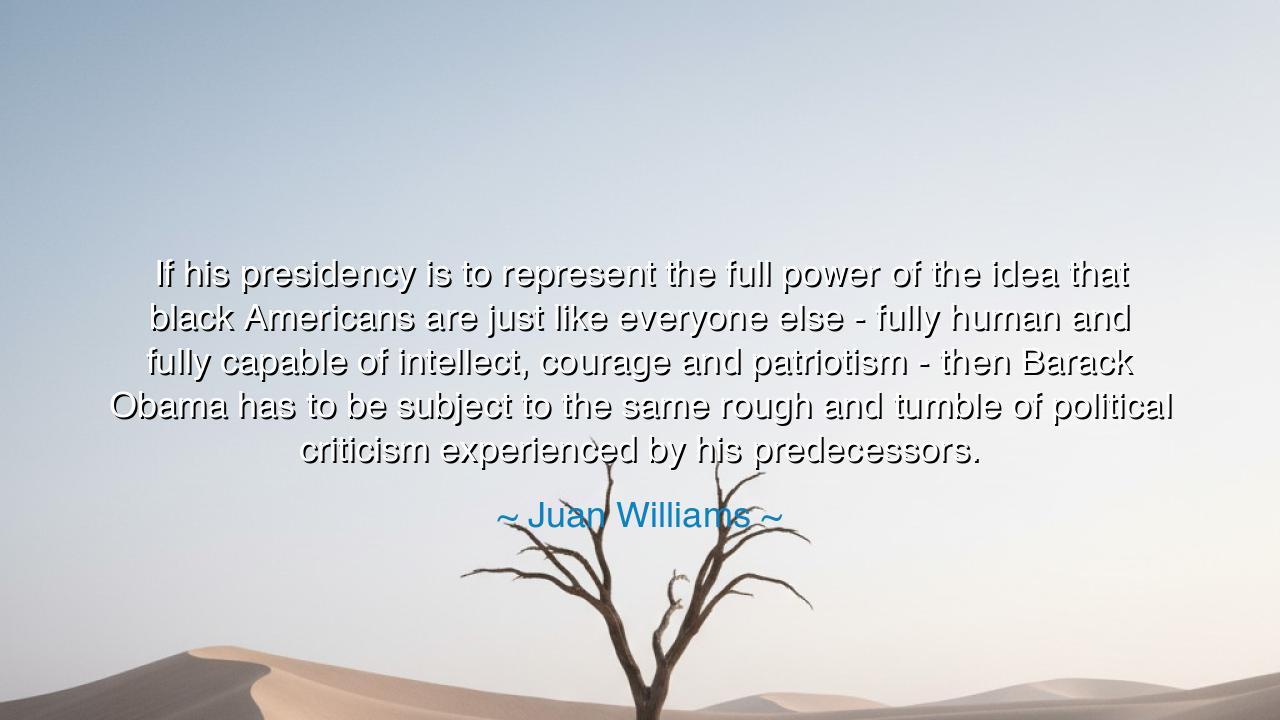
If his presidency is to represent the full power of the idea that
If his presidency is to represent the full power of the idea that black Americans are just like everyone else - fully human and fully capable of intellect, courage and patriotism - then Barack Obama has to be subject to the same rough and tumble of political criticism experienced by his predecessors.






“If his presidency is to represent the full power of the idea that black Americans are just like everyone else — fully human and fully capable of intellect, courage, and patriotism — then Barack Obama has to be subject to the same rough and tumble of political criticism experienced by his predecessors.” Thus spoke Juan Williams, the chronicler of truth and witness to the struggles and triumphs of African America. His words cut through the sentiment of celebration to reach the bedrock of equality itself. In them, he declares that true equality is not found in protection from criticism, but in the willingness to stand as an equal among all — judged by the same measures, tested by the same fires.
This quote arose in the time when the United States, after centuries of bondage, segregation, and struggle, saw the rise of its first Black president, Barack Obama. To millions, his election was the crest of a long and weary tide — the visible proof that the dream of freedom and equality was possible. Yet Williams, with the clarity of a historian’s mind and the courage of a truth-teller, reminded his people that the journey of justice is not complete when barriers are broken; it continues when the one who has broken them stands as an equal, neither exalted by novelty nor shielded by pity. To demand fairness means to welcome accountability.
In these words lies the ancient wisdom of balance — the understanding that dignity is not achieved through exemption, but through participation. To be equal is to be held to the same standards, to endure the same scrutiny, and to prove one’s worth not through privilege, but through performance. Williams speaks not only to the fate of Obama, but to all who have risen from oppression into prominence. He warns that to protect such figures from criticism out of reverence or fear of offense is to diminish them; it is to say, subtly, that they are not strong enough to stand where others have stood. True respect, he teaches, is forged in the same rough and tumble that tests all leaders — the heat that reveals character and purifies greatness.
Consider the example of Frederick Douglass, born a slave, yet becoming one of the greatest voices for liberty the world has ever known. When he first rose to speak among abolitionists, some wished to shield him from the full storm of politics, fearing the world’s prejudice. But Douglass refused protection; he demanded to speak and to be challenged as any free man would. “I prefer to be true to myself,” he said, “even at the hazard of incurring the ridicule of others.” Like Douglass, Williams’ insight is rooted in the conviction that freedom without responsibility is but another form of bondage. Equality demands courage, not comfort.
In invoking Obama’s presidency, Williams calls upon the moral imagination of America. He reminds the nation that it cannot celebrate diversity while denying its participants the full experience of citizenship — which includes both honor and rebuke. If Obama were treated with excessive reverence, insulated from criticism for fear of racial backlash, then his leadership would cease to symbolize equality; it would symbolize fragility. But if he were held to the same trials as Washington, Lincoln, Roosevelt, or Kennedy, then his presidency would stand as proof that America’s promise — that a person’s worth is measured not by color, but by conduct — had drawn one step nearer to fulfillment.
There is in this teaching a deeper lesson for all generations: that true respect is born not of indulgence, but of honesty. To honor another human being is to speak truth to them, not to surround them with silence. Whether in politics, in friendship, or in family, the same law holds — that love which flatters is shallow, but love which challenges is divine. The ancients knew this when they said, “The gods favor those who are tested.” For strength without trial is weakness, and greatness without criticism is illusion.
Let this, then, be the wisdom we carry forward: never ask for gentleness when what is needed is justice. Never confuse reverence with restraint. If we wish for a world of equality — of intellect, courage, and patriotism shared by all — we must grant each soul the dignity of being held accountable, and the opportunity to prove its worth under the same weight of expectation. Equality demands not a lighter burden, but an equal one.
And so, remember the counsel of Juan Williams: that true equality shines not in praise unearned, but in the fearless meeting of the same standards that define the strong. Only when the sons and daughters of every race can stand unguarded before the judgment of their peers — tested, challenged, yet unbroken — will the promise of humanity’s equality be fulfilled. Then, and only then, will freedom stand whole, and justice no longer need to whisper its name.






AAdministratorAdministrator
Welcome, honored guests. Please leave a comment, we will respond soon